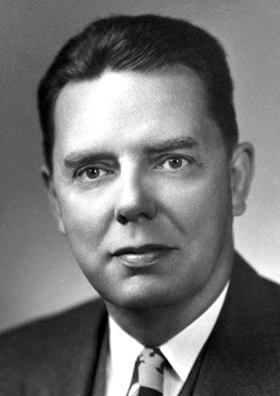Philip Showalter Hench
Philip Showalter Hench (February 28, 1896 – March 30, 1965) was an American physician who is best known for his work in the field of rheumatology. He was awarded the Nobel Prize in Physiology or Medicine in 1950, along with Edward Calvin Kendall and Tadeus Reichstein, for their discoveries relating to the hormones of the adrenal cortex, their structure, and biological effects.
Early Life and Education[edit | edit source]
Philip Showalter Hench was born in Pittsburgh, Pennsylvania. He attended Lafayette College in Easton, Pennsylvania, where he earned his undergraduate degree. He then went on to receive his medical degree from the University of Pittsburgh School of Medicine in 1920.
Career[edit | edit source]
After completing his medical degree, Hench joined the staff of the Mayo Clinic in Rochester, Minnesota. It was here that he began his pioneering work in the field of rheumatology. Hench's research focused on the treatment of rheumatoid arthritis, a debilitating condition that causes chronic inflammation of the joints.
Discovery of Cortisone[edit | edit source]
Hench's most significant contribution to medicine was his discovery of the therapeutic effects of cortisone in the treatment of rheumatoid arthritis. Working with Edward Calvin Kendall, who had isolated compounds from the adrenal cortex, Hench demonstrated that cortisone could dramatically reduce the symptoms of rheumatoid arthritis. This groundbreaking discovery led to the development of new treatments for a variety of inflammatory conditions.
Nobel Prize[edit | edit source]
In 1950, Hench, Kendall, and Tadeus Reichstein were jointly awarded the Nobel Prize in Physiology or Medicine for their work on the hormones of the adrenal cortex. This recognition highlighted the importance of their discoveries in the field of medicine and their impact on the treatment of inflammatory diseases.
Later Life and Legacy[edit | edit source]
Philip Showalter Hench continued his work at the Mayo Clinic until his retirement. He passed away on March 30, 1965, in Owatonna, Minnesota. Hench's contributions to medicine, particularly in the field of rheumatology, have had a lasting impact on the treatment of inflammatory diseases.
See Also[edit | edit source]
- Rheumatology
- Cortisone
- Edward Calvin Kendall
- Tadeus Reichstein
- Nobel Prize in Physiology or Medicine
References[edit | edit source]
External Links[edit | edit source]
Search WikiMD
Ad.Tired of being Overweight? Try W8MD's physician weight loss program.
Semaglutide (Ozempic / Wegovy and Tirzepatide (Mounjaro / Zepbound) available.
Advertise on WikiMD
|
WikiMD's Wellness Encyclopedia |
| Let Food Be Thy Medicine Medicine Thy Food - Hippocrates |
Translate this page: - East Asian
中文,
日本,
한국어,
South Asian
हिन्दी,
தமிழ்,
తెలుగు,
Urdu,
ಕನ್ನಡ,
Southeast Asian
Indonesian,
Vietnamese,
Thai,
မြန်မာဘာသာ,
বাংলা
European
español,
Deutsch,
français,
Greek,
português do Brasil,
polski,
română,
русский,
Nederlands,
norsk,
svenska,
suomi,
Italian
Middle Eastern & African
عربى,
Turkish,
Persian,
Hebrew,
Afrikaans,
isiZulu,
Kiswahili,
Other
Bulgarian,
Hungarian,
Czech,
Swedish,
മലയാളം,
मराठी,
ਪੰਜਾਬੀ,
ગુજરાતી,
Portuguese,
Ukrainian
Medical Disclaimer: WikiMD is not a substitute for professional medical advice. The information on WikiMD is provided as an information resource only, may be incorrect, outdated or misleading, and is not to be used or relied on for any diagnostic or treatment purposes. Please consult your health care provider before making any healthcare decisions or for guidance about a specific medical condition. WikiMD expressly disclaims responsibility, and shall have no liability, for any damages, loss, injury, or liability whatsoever suffered as a result of your reliance on the information contained in this site. By visiting this site you agree to the foregoing terms and conditions, which may from time to time be changed or supplemented by WikiMD. If you do not agree to the foregoing terms and conditions, you should not enter or use this site. See full disclaimer.
Credits:Most images are courtesy of Wikimedia commons, and templates, categories Wikipedia, licensed under CC BY SA or similar.
Contributors: Prab R. Tumpati, MD


